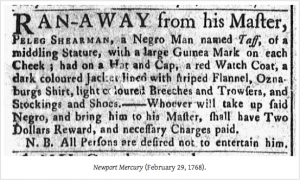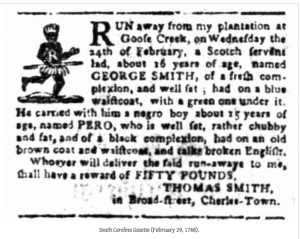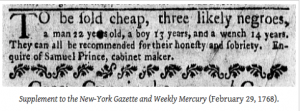This digital public history project, the Adverts 250 Project, is a collection of advertisements. The advertisements shown are all from eighteenth century America. Mainly, the project began as a slavery project, and mostly sets out to represent and archive the peak of American racism and dehumanization of black citizens who were slaves at the time. Every day, an advertisement from that exact day 250 years earlier is posted. Students at Assumption College, along with some “Accessible Archives”, have assembled this collection in order to reveal primary sources that represent the sociohistorical context of slavery and extreme racism in America. There are many different primary sources, such as advertisements for slaves that are “to be sold”. There are also notices that inform of runaway slaves and offer rewards for the return of said slaves. The language used to describe these slaves is often very dehumanizing, even describing one slave’s appearance as “evil”.



The archive does a good job of directly showing the primary sources on their home page. The market of posting an advertisement from the exact day 250 years earlier is a good strategy as well, because it somewhat immerses the audience into the history and makes it interactive. I thought the “Advertising Adverts 250” tab was a little confusing and I wasn’t exactly sure what order they chose to structure those who featured the project. Also, I feel as though the tab that represented the name shouldn’t have been just about those who featured the project, but more focused on the project itself. Overall, I think this is a good way to try to understand the social context of American society at our exact moment 250 years earlier, and the interactive nature of this project somewhat amends the impersonal nature of a digital archive. However, a digital archive is by nature impersonal, as most technology tends to be. While accessibility is increased exponentially with the use of this program, there is a loss in the sense of authenticity, and this can possibly lead to a diminishing interest, or at the least a reduced impact of the historical significance.
–Peter McKasty
